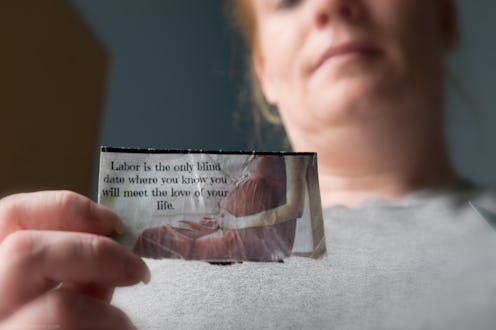Life
Here's What Life Is Like For Mothers In Prison

When you think of women in prison, a heartwarming image doesn't exactly come to mind — but one artist is seeking to change that: Photographer Cheryl Hanna-Truscott is giving us a glimpse into what life is like as a mother behind bars. Hanna-Truscott has spent more than 10 years with the members of the Residential Parenting Program at the Washington Correctional Center for Women, expanding on her project named Protective Custody. She's not merely an observer, though; she's also a certified nurse midwife and has years of experience in a child abuse evaluation clinic. Her photos capture the tender moments between incarcerated mothers and their precious babies, all within the walls of the WCCW. It is through this project that Hanna-Truscott hopes to, per her website, bring "this invisible and voiceless population into public consciousness."
"Significantly, the majority of women entering prison pregnant, even for relatively short prison sentences, are separated from their babies after giving birth," Hanna-Truscott tells Bustle. "Or from the babies' point of view, they are separated from their mothers for a crime they did not commit at a critical time of development." This fact is why the Washington Correctional Center for Women stands out among the crowd: There, new mothers actually get to stay with their children. he Residential Parenting Program at the prison was created in 1999, and it allows pregnant inmates who have been sentenced for less than 30 months to stay with their babies after giving birth. They share a room and have the support and guidance of volunteer doulas and caregivers.
It's also one of the reasons Hanna-Truscott so drawn to the WCCW's Residential Parenting Program: It takes pregnant women and children in a typically inhumane setting, and considers the welfare of both mother and child.
Protective Custody is more than a series of engaging photographs. "Pregnant inmates have specific needs based on the recognition that two people are vitally affected," Hanna-Truscott tells Bustle. "Analysts have pointed out that prison systems have largely been modeled on male populations." She of course understands the need to protect the public and hold individuals accountable for criminal behavior; but there's more to it than that: "There also needs to be appropriate and thoughtful solutions," she says. "The bottom line is that there is research supporting prison nursery programs for non-violent, short-term incarcerated women."
This is an absolutely crucial point — because most minimum security female offenders have nonviolent offenses. With the number of incarcerated women in the United States having skyrocketed to over one million, Hanna-Truscott's argument for more programs like the one at the WCCW is easy to get behind. "Babies don't know they're in prison. They just know they're safe and secure in a loving environment with their mothers," she says.
And this bond between a mother and her baby is as vital to the baby's health as regular check-ups with the doctor. Parenting research has shown that this strong emotional attachment can prevent diseases, strengthen immunity, and enhance the IQ of your little one. Why deny an innocent child a healthy and happy life?
Hanna-Truscott's moving series certainly shines light on an otherwise forgotten issue; and it is my hope that parenting programs like this will become more available in the near future. To learn more about Protective Custody, you can visit the project's website. You can also head to HannaTruscott Photography to learn more about this photographer and her groundbreaking work.
Images: Courtesy of HannaTruscott Photography and Protective Custody